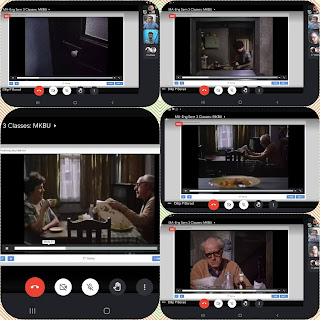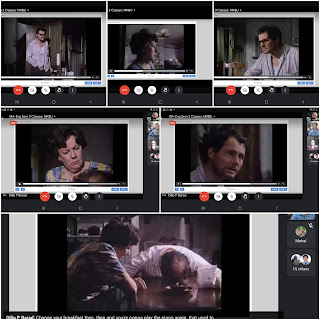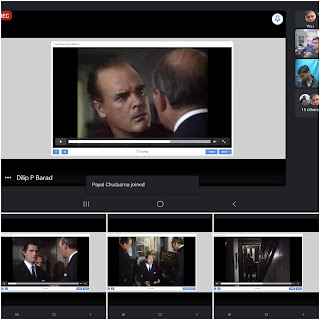 |
| In this collage, it starts from door. Door and knocking on it, is symbol of intrusion. It is a nostalgia of past. |
The scene is the setting of this play, where the hatch separates room from kitchen. Petey is reading newspaper and Meg is asking him, what he is reading? And the conversation from Casual to absurd transforms. Where at last she asks that what he is telling of girl, she isn't concern about but a boy.
At last the scene ends at her going upstairs to wake up Webber Stanley and some noise is coming from upstairs, that is followed by Petey's expression as knowing everything but can't do anything.
As reading newspaper and knowing all the happenings of the world, but can't do anything as he can't do anything, at the cost of damaging himself.
While here mirror is also a symbolic representation of narsicism, showing object as it is and also reflecting the threshold between conscious and unconscious mind.
If we read Meg's character in this context then she herself assume Petey impotent of not giving her child, so she feels incomplete and the thing which is in her unconscious mind, keeps on surfacing indirectly in unpleasant manner. Where may be Petey is realizing and so not opposing Meg's attitude of dealing with Webber Stanley.
How it is that "an inability is an automatic suppression" that represses our voice and we're unable to defend ourselves though the situation seems unwanted or in another way it can be interpreted that perhaps Petey lacks the tendency of confrontation. He fears that if he will react against the lady, she may be retorting in ruthlessness and that would be an unbearable situation for him to handle.
But here a question arises though people don't like to discuss their deficiency, but there may be an another side of the coin, where you can accept the situation as it is and try to improve it. May be it will reward you your wanted benefits. The idea seems to be ideal and more time seeking but if one wants to, one can take this road also.
Moving further with movie screening, we also see how the toy drum is gifted, which symbolizes a foreshadowing scene that in alike manner Stanley is going to be tormented by MC Can and Nat Goldberg.
In this sequence of screenshots, the newspaper is torn up by MC Cann, in five equal parts. When it is torn up, it has a careful tearing sound, like the voices which are raised through news updates, won't be heeded. An intentional attempt for suppression or one can interpret as foreshadowy image. As both MC Can Dormet and Goldberg are going to interrogate Stanley.
Where they ask him one after another questions, without giving a person time to think of(torrenting of language) where the logic arguments, turn out in illogicity. Seems as an endeavour for intentional distortion of person's psychology, so in confusion, rather than protesting, he will succumb to the situation.
Where they ask Stanley, where is your wife, you killed your wife, she was waiting for you at porch to marry you. Which seems as inassociate questions and if reading through feminist perspective then the underlying meaning suggests that Stanley is a womanizer as Seargent Troy was in 'Far from the madding crowd'-Thomas Hardy. Where he may have tormented the womankind so badly, so now in the form of investigation, it is reflecting.
If analytically we see then, interrogation seems to be carried to get the truth from Stanley's mouth or some confirmation of the past revealed truth in front of Stanley, where may be though part of the gangster Monty's party, he gradually realised that It isn't ok to be here(As it happens in 1984 novel by Orwell, with one of his characters named 'Winston Smith' where though regardance with outer party, came to know about inner party and joins one of the members of the brotherhood organisation as believing it an organisation with kindred spirit, with his lover named Julia.
As he himself is morally righteous man, who can't be easily succumbed to any unwanted situation, is further tormented by the party to surrender and adore it. Same happens, after facing terrific situation of being alive eaten by running rats, rather than facing situation and coming out victoriously, he succumbs to and starts doing as he is expected to.
While in Stanley's case, Stanley being a rebellious, left that place and accidentally came in boarding house near Seaside London, occupied by Meg and Petey. Here also he isn't spared as it is said that: "what we fear to confront, will be destined to encounter you soon". Likewise it happens with Stanley.
In second act, in birthday party scence. The birthday party is being organised by Meg and also a gift is offered to Stanley, where though denied by Stanley, for this isn't his birth date the members like MC Can Dormet and Nat Goldberg are invited along with LULU. In between the ongoing party Nat Goldberg flatters LULU in his speech and got success in maintaining proximity with her.
Further discussing about LULU and MC Can further intimation, let's have a look on Stanley's confrontation. For Stanley Meg is a motherly figure(or as it seems something more to this) and LULU a symbolic character, involved in snatching him from his comfort and warmth(seeing in form of MEG).
Here we may have connection from Harold Pinter's background history. Where he is saying I love my mother but not the father as he is strict disciplinarian(representing a society{traditional one}) and may be this was suffocating for him. While his mother preferred modern way of living where individual preference for living is given prime importance.
We can only make some assumptions that perhaps the life of Stanley is somewhere contemplating Harold Pinter's life.
In last frame studies of aforementioned collage, if we visualize then camera is one top, which is moving, focusing the room and Stanley's movements in the room. It seems from top a prison cell/cage when someone is trapped. This also is a foreshadowy image as indicating that something unusual is going to happen and it happens.
He is badly investigated by the two strangers and taken away from Meg and Petey's house. Where Petey being helpless and broken can't do anything rather than advising him "don't let them tell you what to do". Indicating don't succumb to the situation, it would be better if one can destroy one's life. If won't be literally destroyed but rather an uncontaminated soul will get released into the new and free world.
Because surrendering oneself to any unreasonable and unpleasant situation is in itself a death. Which we can literally relate to absurdism, where without hope one has to live, for the sake of living not thriving and If opposed the established way of life, he would be sentenced to death, but in a way this death with suffice, rather than living deadly with tormenting soul.
In some of the scenes we only have seen the knob of the door but in last scence the entire door is opened, and we can see it along with its frame. The thing is how one can interpret? In an early scene, when the door was knocked there was arrival of LULU: an inspiration for an artist. Who is coming through the narrowing door and opening the inside door with full aspirations. If reading in contradictory manner then the entire outside door is opened, which will narrow down as the artist, who symbolises the very notion of freedom of speech, is going to be curtailed and now there isn't any inspiration.
After taking Stanley away, none knows where he goes, besides Petey also answers Meg as Stanley is upstairs rather than saying the recent actual truth. But yes one can assume as Petey already known of the facts of the worldly matters, he senses something and so advising Stanley to contemplate so but can't say anything openly as his speech is already curtailed, he can't speak anything, damaging himself.
Last scence of the movie by Freidkin.
As the movie is based on modern idea, an additional scene of the outdoor frames is highlighted. Where only one can see through the side-view of the car, the swirling visual images row houses, streets and then stopping at street lamp. At first the lamp is sharply brightening then it is becoming dull. While actually it has to be start from the boarding room, where the whole movie is situated because none of the elements of the movie, goes out of this room. Where the former scene seems to be vague and irrelevant with car drive.
The two scenes from LULU are omitted in th play, may be because the writer wants to directly apply the idea of marginalization and suppression of woman voice. Otherwise it would have been elaborated in traditional manner. A woman being raped, lodged a complaint and the judicial proceedings further. But it isn't shown.
If feministic reading is applied and refering to the conversation between Nat Goldberg and LULU, then though Goldberg is seemingly shrewd, cunning and lustrous, it doesn't keep away LULU to be doubted. As if she was already with her boyfriend Adei and was living well-contented then why she chose to be with Goldberg. How the mind is shaped, rather than resisting and deciphering the difference, it is surrendering to superficial and shallow rhetoric? May be it is happening due to obsession like negative emotion. Where you have lost your deciphering sense and as a robot is given sentence, you're directed to and until and unless you're not completing that task, you won't be free from intruding clutches.
In another way it can be interpreted as having taken this matter in usaul manner(one of the modern characeristics)the writer decided to not to talk about as the matter and its happenings are much discussed, why to discuss more, until now people have understood, why such things are happening, what are the causes. Is it that only the man is to blame but not the woman? As rules are in favor of women. Or somethingelse is going on in the background.
Kafkaesque is associated with something, which is unknown to us and we're inevitably thrown into some situation. Where one has to see how to live in such complicating, distorting circumstances, which eventually leading to person's own realization. We have some examples of The Trial, Professor K, Metamorphosis, the hunger artist(where the protagonist serves others with his fake art, but eventually realizes that it was fraud).
Art, Truth anPolitics-Excerpts from Nobel Lecture 2005
When reading truth in citizenship and Art context then in Arts the truth is represented in elusive manner, It can be necessarily either true or false. And also there won't we findany necessity to ask about the true or false concept.
There may be many interpretations based on experience, contemplation or specific point of view regarding drama. While being a citizen one has to ask what is true because it is a humanright and Harold Pinter remains to be a controversial figure for fighting for human rights.
Similarly it can be seen through Stanley's character, regarding the background history that he may have tried to voice his voice, considering it as a human right, but other capital forces tried to suppress his voice. Don't feeling wanted, he would have ran away from the place. Keeping authority in doubt, if something is revealed to him and as it is seen he is courageous, he will reveal everything and the entire elusive building would crumbled down.
While in politics they any concern with this truth even those won't dare to travel through that territory. They will only consider their power and try to maintain power. Therefore they remain in this tapestries of lies. Which is actually facilitating their manipulative truth.
Critical Analysis of the play
It can be read through many aspects, feminist, arts, politics and truth, revolution, suexpression etc. We will discuss further at extent.
Conclusion
Thus we saw the film is based on pintereque, where the background history of the writer is aptly depicted in this film. Though many background things aren't clearly shown, but one can by guessing reach to its then happenings with some interconnected ideas.
Works Cited
- "A drama film: The Birthday Party". Directed by William Freidkin, 1968.
- Hardy, Thomas., "Novel: Far From the Madding Crowd", published in 1874.
- Orwell, George., "Modern Novel: 1984".
- Esslin, Martin., "The Absurdist Theatre".
- Deer, Harriet, and Irving Deer. “Pinter's ‘The Birthday Party’: The Film and the Play.” South Atlantic Bulletin, vol. 45, no. 2, 1980, pp. 26–30. JSTOR, www.jstor.org/stable/3199140. Accessed 28 Nov. 2020.
- Pinter, Harold. “Art Truth & Politics: Excerpts from the 2005 Nobel Lecture.” World Literature Today, vol. 80, no. 3, 2006, pp. 21–27. JSTOR, www.jstor.org/stable/40159078. Accessed 28 Nov. 2020.










No comments:
Post a Comment